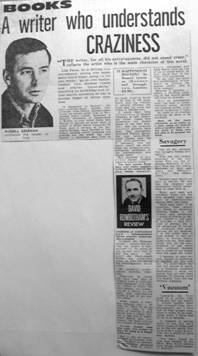


|
The details “grisly”, the people “lunatic”, the results, “magnetic”. |


|
Viewpoint It Happened in Boston?
“A Writer Who Understands Craziness” The Courier Mail Brisbane © 1969 David Rowbotham (text reproduced 2005 with kind permission of the author) |
|
“The writer, for all his extravagances, did not sound crazy,” reflects the artist who is the main character of this novel. Like Faust, he is delving into necromancy, poring over books about black magic, going (in his own words) “ga-ga over voodoo, hoodoo, juju, mumbo jumbo and similar hocus-pocus,” searching for knowledge and, in that search, assuming he has to become bigger and better than God. ‘It Happened in Boston?”, the title’s question mark implies that anywhere from Boston, Massachusetts where the novel’s artist lives, to Wittenberg where Luther launched a religious revolution of consequence to Boston, to Linz where Hitler who wanted to become an artist went to school, to Milan where Leonardo da Vinci, once a servant to the poisonous Borgias, was a founder of “the Italian method which produced the greatest art the world has ever known”— anywhere man lives in his inner mind as much as he does in the outer world, and the conflict of tension between the inner and the outer can wreck or remake him. It could have been dangerous to Russell Greenan, a new American writer (these New Americans are streets ahead of the New English), that his favourite modern authors have been that courageous, half-mad French genius, the late Louis-Ferdinand Céline, and the wild Irish-American J.P.Donleavy, who has learnt nearly too much from the stream-of-consciousness technique of the schizophrenic late James Joyce. But madness in any event except violence seems a relative thing. The only person these days who really appears to be off his rocker is the one whom mankind's condition of confinement and beleaguerment leaves entirely unmoved, like a zombie. Anyhow, Mr. Greenan proves—despite the fact that the reader is confounded till the pieces of the jig-saw story start to fall into place—that, like the black-magic writer his artist-hero reads, he does not, for all his extravagances, sound crazy. He certainly understands, however, craziness. Otherwise he would not have been able to present such a chillingly good character, who ends up (which is where the story begins) day-dreaming on a bench in the park, and nightmaring under a bed in his studio-rooms. What makes a man, any ordinary man—he does not have to be an artist—mad, to the point of turning a park bench into a magic carpet, a bed into a bombproof shelter, and, ultimately, the mind into an instrument of homicide? No-one should read this book who wishes to bury his head in a happy week-end. But it can be recommended to anybody who, settling down in comfort, is nevertheless prepared to taste, even if vicariously, discomfort and some horror with his cup of tea or coffee which, he may thank God, is not laced with strychnine. To say that the story is a psychological thriller would be putting the matter mildly and a little wrongly. Because it becomes—slowly—thrilling, nothing of the story’s action will here be revealed. But to comprehend what the book is fundamentally about, beyond the external action, is essential to getting it right. So some of its internal workings do have to be disclosed. Here let the main character, as an artist, as a man, speak for himself with a lucidity that is often given to those who are said to around the bend. “Can we say, perhaps, that savagery breeds savagery?” “Who was this clumsy Architect of the universe? Who was this liberal Bestower of pain and death, this feelingless Father, this demon Deity? “ Modern man wants no part of horror. He has lost the religious and philosophic beliefs necessary to cope with it. “Rats, and men are brothers. They are the only animals that fight wars of extermination among their own kind. “Each man seeks to be immortal. Most satisfy this desire by fathering children. Some—the soldiers and politicians—strive to live on in legend. Others— the men of business—find their hope of eternal life in the perpetuity of houses of commerce and great fortune. Of all, however, it is the artist who is most greedy in this respect. A horror slowly came over me. The realization that all the masterpieces of the world were pitilessly doomed was a shrew in my breast that fed upon my heart..” |


